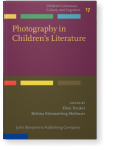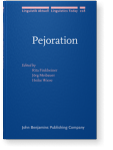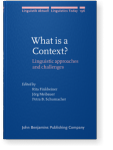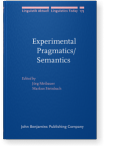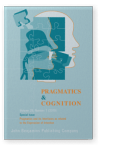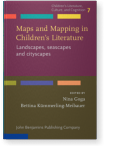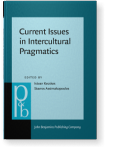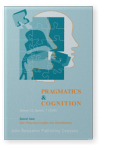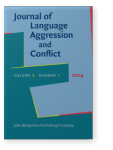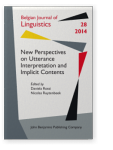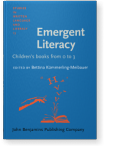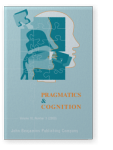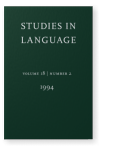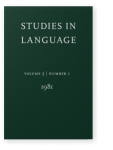Jörg Meibauer
List of John Benjamins publications for which Jörg Meibauer plays a role.
Book series
Titles
Pejoration
Edited by Rita Finkbeiner, Jörg Meibauer and Heike Wiese
[Linguistik Aktuell/Linguistics Today, 228] 2016. vii, 357 pp.
Subjects Pragmatics | Semantics | Syntax | Theoretical linguistics
What is a Context?: Linguistic approaches and challenges
Edited by Rita Finkbeiner, Jörg Meibauer and Petra B. Schumacher
[Linguistik Aktuell/Linguistics Today, 196] 2012. vii, 253 pp.
Subjects Pragmatics | Semantics | Syntax | Theoretical linguistics
Experimental Pragmatics/Semantics
Edited by Jörg Meibauer and Markus Steinbach
[Linguistik Aktuell/Linguistics Today, 175] 2011. x, 240 pp.
Subjects Pragmatics | Semantics | Theoretical linguistics
2023 Chapter 10. Portrait of the child as a socialist: Three photographic picturebooks from the German Democratic Republic Photography in Children's Literature, Druker, Elina and Bettina Kümmerling-Meibauer (eds.), pp. 232–253 | Chapter
This chapter focuses on portraits of children in three photographic picturebooks from the German Democratic Republic (GDR). While these picturebooks draw largely on modernist photography in the postwar period, they also react sensitively to ideological demands from the official state authorities. read more
2023 Chapter 3. As ‘objectively’ as possible. On truth and objectivity in photographic early-concept books: The case of The First Picture Book and The Second Picture Book by Mary Steichen and Edward Steichen Photography in Children's Literature, Druker, Elina and Bettina Kümmerling-Meibauer (eds.), pp. 67–91 | Chapter
Photographic picturebooks appear to have a special relationship to reality. In contrast to paintings and drawings, photos are often said to convey true and objective information about the world. Drawing on recent work in picture theory and the philosophy of pictures, the question is posed as to… read more
2019 What is an indirect speech act? Reconsidering the literal force hypothesis Pragmatics and its Interfaces as related to the Expression of Intention, Kecskés, István (ed.), pp. 61–84 | Article
The notion of an indirect speech act is at the very heart of cognitive pragmatics, yet, after nearly 50 years of orthodox (Searlean) speech act theory, it remains largely unclear how this notion can be explicated in a proper way. In recent years, two debates about indirect speech acts have stood… read more
2017 Chapter 4. Metaphorical maps in picturebooks Maps and Mapping in Children's Literature: Landscapes, seascapes and cityscapes, Goga, Nina and Bettina Kümmerling-Meibauer (eds.), pp. 75–91 | Chapter
This chapter focuses on the cognitive and narrative functions of metaphorical maps in picturebooks. In contrast to maps that present real or fictional city- and landscapes, metaphorical maps are used to visualize abstract concepts. In particular, two types of metaphorical maps in picturebooks are… read more
2017 Chapter 2. “Western” Grice? Lying in a cross-cultural dimension Current Issues in Intercultural Pragmatics, Kecskés, István and Stavros Assimakopoulos (eds.), pp. 33–52 | Chapter
Lying is a cognitive ability serving the deception of interlocutors. Following Grice (1989), we can say that lying violates the first maxim of Quality. Yet there are scholars who argue that the “Western” (rationalist, individualistic) view of Grice cannot account for the social and cultural… read more
2016 What is pejoration, and how can it be expressed in language? Pejoration, Finkbeiner, Rita, Jörg Meibauer and Heike Wiese (eds.), pp. 1–18 | Article
2016 Slurring as insulting Pejoration, Finkbeiner, Rita, Jörg Meibauer and Heike Wiese (eds.), pp. 145–166 | Article
This paper contributes to the ongoing debate about the meaning of slurs by developing a speech-act approach to slurring. Slurs are conceived of as illocutionary force indicating devices that may signal – in certain contexts – that an act of slurring has been carried out. Slurring is a subtype of… read more
2016 Aspects of a theory of bullshit New Theoretical Insights into Untruthfulness, Dynel, Marta (ed.), pp. 68–91 | Article
This paper addresses the question whether bullshit is a reasonable pragmatic category. In the first part of the paper, drawing on the insights of Harry Frankfurt’s seminal essay, bullshit is defined as an act of insincere asserting where the speaker shows (a) a loose concern for the truth, and (b)… read more
2014 Bald-faced lies as acts of verbal aggression Journal of Language Aggression and Conflict 2:1, pp. 127–150 | Article
Several philosophy of language scholars have recently argued that the intention to deceive is not part of a well-defined concept of lying. So-called bald-faced lies, i.e., asserting what is false while speaker and hearer both understand that the speaker does not believe what s/he asserts are… read more
2014 A truth that’s told with bad intent: Lying and implicit content New Perspectives on Utterance Interpretation and Implicit Contents, Rossi, Daniela and Nicolas Ruytenbeek (eds.), pp. 97–118 | Article
In recent years, a lively debate has emerged about the question of correctly defining lying. Two strands of argumentation have evolved in the philosophy of language: First, the idea that lying is not necessarily connected to an intention of the speaker to deceive the hearer (e.g., Carson 2010);… read more
2012 Introduction What is a Context?: Linguistic approaches and challenges, Finkbeiner, Rita, Jörg Meibauer and Petra B. Schumacher (eds.), pp. 1–6 | Article
2012 What is a context? Theoretical and empirical evidence What is a Context?: Linguistic approaches and challenges, Finkbeiner, Rita, Jörg Meibauer and Petra B. Schumacher (eds.), pp. 9–32 | Article
Although most scholars would accept that the notion of context is fundamental not only for pragmatics, but also for linguistics in general, robust theories of context are lacking. After sketching traditional approaches that suppose a scale between neutral and rich contexts, mapping aspects of this… read more
2011 6. Early-concept books: Acquiring nominal and verbal concepts Emergent Literacy: Children's books from 0 to 3, Kümmerling-Meibauer, Bettina (ed.), pp. 91–114 | Article
This article focuses on picturebooks for young children aged 12 to 24 months. This type of picturebook has been largely neglected in picturebook research, albeit it provides fascinating insights into the literary and cognitive development of young children. Two types of picturebooks will be… read more
2011 Introduction: Experimental research at the pragmatics/semantics interface Experimental Pragmatics/Semantics, Meibauer, Jörg and Markus Steinbach (eds.), pp. 1–18 | Article
Focusing on the semantics/pragmatics divide, the contribution of experimental pragmatics to pragmatic theory is discussed from a number of angles, ranging from implicature theory and theories of pragmatic enrichment to pragmatic acquisition, pragmatic impairment, and pragmatic processing. In… read more
2008 Tautology as presumptive meaning Pragmatics & Cognition 16:3, pp. 439–470 | Article
Ever since the seminal work of Paul Grice, tautologies such as Business is business have been discussed from a number of angles. While most approaches assume that tautological utterances have to do with the operation of conversational maxims, an integrated analysis is still lacking. This paper… read more
1994 J. Korhonen (éd.) Phraséologie und Wortbildung — Aspekte der Lexikonerweiterung Studies in Language 18:2, pp. 531–532 | Squib
1981 Review of Grewendorf (1979): Sprechaktiheorie und Semantik (stw 276) Studies in Language 5:1, pp. 148–159 | Review
